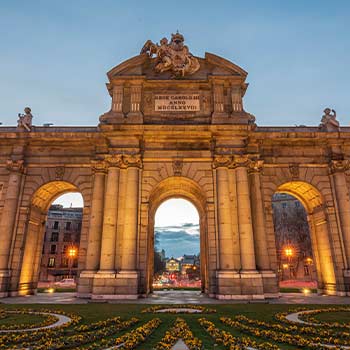Natural Resource Management: Conflict & Cooperation
Business, Design & Innovation Program
Barcelona, Spain
Dates: 1/3/25 - 4/26/25

Natural Resource Management: Conflict & Cooperation
OVERVIEW
CEA CAPA Partner Institution: CEA CAPA Barcelona Center
Location: Barcelona, Spain
Primary Subject Area: Env. Sciences
Other Subject Area: International Relations
Instruction in: English
Course Code: ENV332
Transcript Source: University of New Haven
Course Details: Level 300
Recommended Semester Credits: 3
Contact Hours: 45
Prerequisites: One 200-level course in Environmental Sciences
DESCRIPTION
This course analyzes the transformation occurring at the intersection between the theory and practice of international relations on the one hand and issues related to the management and exploitation of environmental and natural resources on the other.
The relative abundance or scarcity of natural resources has long been a major factor in accounting for the rise and fall of civilizations. It is also a major cause of regional tension and international warfare. Conflicts over the struggle for scarce natural resources (i.e. the so called 'resource curse') are common today while 'resource nationalism' in resource-rich countries (e.g. Russia, Venezuela, and Brazil), exacerbated by tight supply of conventional energy sources, harbors the potential for global economic disruption. In a similar vein, the global scale of modern economic systems blurs the traditional distinction between rich North and poor South. The rise of high-consumption societies now cuts across international regions and borders while the distance between those who benefit from high consumption and those who suffers from its social and environmental impact grows inexorably.
Notwithstanding, we have witnessed over the last four decades the emergence of a deeper understanding of the intrinsic value of environmental natural resources along with a newly-felt sense of urgency for dealing with the collective problems arising from their use and (or) degradation. The concept of natural resources has expanded from a traditional, restrictive view of simple material economic inputs to one that now includes those environmental and ecosystem variables whose role is fundamental in guaranteeing the integrity of life-supporting earth systems.
You will address and analyze these realities in three parts. You begin by reviewing the basic concepts and theories of international relations theories as well as the evolution of the analytical paradigms that have been used to frame the relation between human development and the natural environment. You will then focus on the visible output of global environmental politics, i.e. international regimes for environmental, nature and habitat protection and conservation. The course will end by looking in detail at the energy-climate nexus, as the competition for hydrocarbons represents a potential trigger of conflict but which also opens the doors to a serious effort to accelerate the pace of development and deployment of alternative sources of energy that are key to reducing the production of greenhouse gases.
This course is cross-listed as IRS332
The relative abundance or scarcity of natural resources has long been a major factor in accounting for the rise and fall of civilizations. It is also a major cause of regional tension and international warfare. Conflicts over the struggle for scarce natural resources (i.e. the so called 'resource curse') are common today while 'resource nationalism' in resource-rich countries (e.g. Russia, Venezuela, and Brazil), exacerbated by tight supply of conventional energy sources, harbors the potential for global economic disruption. In a similar vein, the global scale of modern economic systems blurs the traditional distinction between rich North and poor South. The rise of high-consumption societies now cuts across international regions and borders while the distance between those who benefit from high consumption and those who suffers from its social and environmental impact grows inexorably.
Notwithstanding, we have witnessed over the last four decades the emergence of a deeper understanding of the intrinsic value of environmental natural resources along with a newly-felt sense of urgency for dealing with the collective problems arising from their use and (or) degradation. The concept of natural resources has expanded from a traditional, restrictive view of simple material economic inputs to one that now includes those environmental and ecosystem variables whose role is fundamental in guaranteeing the integrity of life-supporting earth systems.
You will address and analyze these realities in three parts. You begin by reviewing the basic concepts and theories of international relations theories as well as the evolution of the analytical paradigms that have been used to frame the relation between human development and the natural environment. You will then focus on the visible output of global environmental politics, i.e. international regimes for environmental, nature and habitat protection and conservation. The course will end by looking in detail at the energy-climate nexus, as the competition for hydrocarbons represents a potential trigger of conflict but which also opens the doors to a serious effort to accelerate the pace of development and deployment of alternative sources of energy that are key to reducing the production of greenhouse gases.
This course is cross-listed as IRS332





